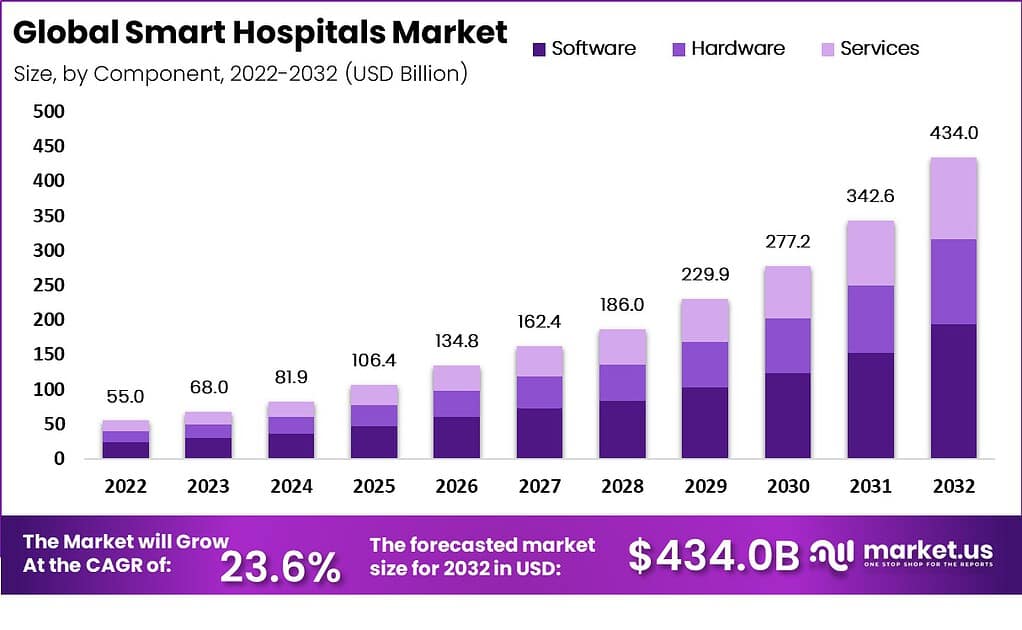Smart Hospitals Market Overview:
The Smart Hospitals market represents a dynamic intersection of healthcare and technology, where advanced digital solutions and data-driven strategies are employed to enhance patient care, streamline operations, and improve overall efficiency within healthcare facilities. These hospitals leverage innovative technologies to create a connected and patient-centric environment while optimizing resource management.
In 2022, the global market for Smart Hospitals reached a valuation of USD 55 Billion. Forecasted to continue its growth trajectory, the market is anticipated to achieve a substantial expansion, reaching USD 434.0 Billion by 2032. This growth will be driven by a notable compound annual growth rate (CAGR) of 23.6% from the year 2023 to 2032.
Want to Access the Statistical Data and Graphs, Request PDF Sample @ https://market.us/report/smart-hospitals-market/request-sample/

Key Takeaways:
- Smart Hospitals integrate cutting-edge technologies to provide enhanced patient experiences, efficient medical processes, and improved clinical outcomes.
- The integration of IoT, AI, data analytics, and automation are central to the transformation of traditional hospitals into smart healthcare ecosystems.
Market Trends:
- Internet of Things (IoT) Integration: IoT devices and sensors are used to monitor patient vital signs, track medical equipment, and optimize facility management systems.
- Artificial Intelligence (AI) in Healthcare: AI-powered systems assist in diagnosing diseases, personalizing treatment plans, and predicting patient outcomes.
- Telemedicine and Remote Monitoring: Smart Hospitals facilitate remote consultations and monitoring, enabling patients to receive care from the comfort of their homes.
- Electronic Health Records (EHR) and Data Analytics: Advanced data analytics tools help healthcare providers make informed decisions by analyzing large volumes of patient data.
- Robotics and Automation: Robotic systems are employed for tasks such as surgery, medication dispensing, and inventory management.
Find additional highlights on the growth strategies adopted by vendors and their product offerings, Buy Sample Report.
Rising Demands and Increasing Uses:
- The demand for efficient healthcare delivery, improved patient experiences, and reduced medical errors is driving the adoption of smart hospital technologies.
- These technologies find applications in patient monitoring, diagnosis, treatment planning, operational optimization, and resource allocation.
Rising Popularity: The popularity of Smart Hospitals is rising due to their potential to revolutionize healthcare delivery. The combination of technology-driven efficiencies and enhanced patient care is attracting both healthcare providers and patients.
Top 5 Trends Propelling Sales:
- Patient-Centric Approach: Smart Hospitals prioritize patient experiences by providing personalized care and seamless interactions through digital channels.
- Healthcare Wearables: Wearable devices are integrated with hospital systems, allowing continuous monitoring of patient health parameters.
- Predictive Analytics: Data analytics tools help forecast disease outbreaks, optimize resource allocation, and predict patient health trends.
- Healthcare Chatbots: AI-powered chatbots provide instant responses to patient queries, appointment scheduling, and basic medical advice.
- Smart Medical Devices: Medical equipment with connectivity features enhance diagnostic accuracy, treatment precision, and patient safety.
Drivers:
- Enhanced Patient Outcomes: Smart Hospitals improve diagnostic accuracy, treatment effectiveness, and patient engagement, leading to better clinical outcomes.
- Operational Efficiency: Automation and real-time monitoring streamline hospital operations, reducing waiting times and resource wastage.
Restraints:
- High Implementation Costs: Integrating advanced technologies and infrastructure upgrades can be costly for healthcare institutions.
- Data Security Concerns: The adoption of digital solutions raises concerns about patient data privacy and cybersecurity.
Challenges and Opportunities:
- Interoperability: Ensuring seamless communication and data exchange among various hospital systems remains a challenge.
- Staff Training: Adequate training for healthcare professionals is essential to harness the full potential of smart hospital technologies.
Largest and Fastest Growing Market:
- North America is currently the largest market for Smart Hospitals due to its advanced healthcare infrastructure and technological capabilities.
Market Segments
By Component
- Hardware
- Software
- Services
By Technology
- Cloud Computing
- Artificial Intelligence
- Big Data
- Internet of Things
- Other Technologies
By Connectivity
- Wireless
- Wired
By Application
- Remote Medicine Management
- Medical Assistance
- Medical Connected Imaging
- Electronic Health Record
- Other Applications
Top Key Players in Smart Hospitals Market
- Medtronic plc
- Siemens AG
- Allscripts Healthcare Solutions, Inc.
- Microsoft Corporation
- Honeywell International Inc.
- Koninklijike Philips N.V.
- GE Healthcare
- SAP SE
- AT &T Inc.
- Apple Inc.
- Other Key Players
Recent Developments:
- Virtual Reality (VR) and Augmented Reality (AR): Some Smart Hospitals are exploring the use of VR and AR for surgical training, patient education, and pain management.
- Blockchain in Healthcare: Blockchain technology is being explored for secure patient data sharing, interoperability, and maintaining medical records.
In conclusion, the Smart Hospitals market represents a paradigm shift in healthcare, driven by technological advancements and the need for improved patient outcomes. As healthcare providers increasingly embrace digital solutions, the future of healthcare is likely to be characterized by a harmonious blend of medical expertise and cutting-edge technology.
More Information and Communications Technology Market Research Reports@ https://market.us/reports/information-and-communications-technology/